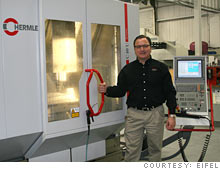The auto collapse's ripple effects
Detroit's turmoil is imperiling auto suppliers around the country, who now face a high-stakes challenge: diversify or die.
 |
| Eifel President Rick Hecker in front of his new Hermle C-40 5-axis CNC machine, purchased to help the company win more business in the medical industry. |
DETROIT (CNNMoney.com) -- As Detroit's Big Three automakers fight for survival, thousands of small suppliers are caught in their economic wake, struggling to adapt to a shrinking industry.
TNT EDM, a tooling company with 35 employees in Plymouth, Mich., has seen its automotive business drop more than 50% since 2004. Founded in 1978, TNT traditionally served customers such as Ford (F, Fortune 500), Metaldyne and FormTech. To stave off the losses as sales to its auto customers declined, the company has begun doing work for different industries. Six years ago, it started targeting the aerospace industry, and in the last two years, TNT has aggressively pursed the medical and energy markets.
The change has been challenging. TNT is still recouping the $2 million to $3 million it invested in its diversification. New business has offset automotive losses, but CEO Tom Mullen said the company's sales are still down about 30% from where they once were.
Still, Mullen is pleased with the progress TNT has made, and sees little choice but to continue targeting new markets. "When one of them is on a down trend, it's going up in the [other industries]," he said. "They seem to balance themselves out."
With sales dropping, auto suppliers face hard choices - Cut staff? Cut hours? Borrow cash to invest in new business lines? - and high stakes. One wrong move can mean the end of a company.
That's what happened to Ronald Vaagenes, the former president of Motor City Mold Inc., a plastic injection molding company that closed in May.
Vaagenes said his company, which had sales of about $2.5 million and 15 employees, invested nearly $1.5 million in its last two years to buy new equipment that would help Motor City Mold compete with foreign manufacturers.
"That was to not only stay even with [foreign competitors], but to beat them," Vaagenes said. "We bought the best that we could buy."
Despite his efforts to turn business around, slow payments from automotive customers and a dispute with the bank caused Motor City Mold to shut its doors after 17 years in business. Vaagenes says he couldn't afford to keep it open.
"We did everything we can," Vaagenes said.
Laura Brown Narvaiz, vice president of communications for the National Association of Manufacturers in Washington, said the federal bailout that is keeping Chrysler and General Motors afloat for now is helping small suppliers as well. Her association hopes that President Obama's economic stimulus package will further support American manufacturers by encouraging domestic auto sales.
Still, Narvaiz sees precarious times ahead. "The failure of one of the Detroit Three is not an option due to the devastating effect that it would have on the manufacturing industry and the domestic economy," she said.
The state of Michigan is taking its own steps to help local manufacturers survive through the auto turmoil. In 2004, Michigan established Tool and Die Recovery Zones, which link groups of small manufacturers with 50 or fewer employees to work together on jobs and share some costs. In turn, companies within the zones receive local tax abatements.
There are 237 small manufacturers now participating in 25 zones, and the state expects to add 10 more zones to provide additional help, said Bridget Beckman, public relations officer for the Michigan Economic Development Corp. So far, companies in the zones have invested $38 million in new infrastructure and equipment to help them become more competitive.
Michigan hopes to help companies expand into additional industries, such as alternative energy, homeland security, medical devices and advanced manufacturing.
"Our diversification efforts have ramped up significantly during this pressing auto crisis, Beckman said. "But, in truth, the state recognized the need to diversify years ago."
Michigan has little choice but to embrace diversification. State officials estimate that every automotive job creates five additional jobs in the local economy. As the domestic auto industry contracts, finding new fields for those manufacturers to target is vital to Michigan's economic recovery.
While diversification has helped at TNT EDM - orders from non-automotive industries now account for about 35% of the company's business - CEO Tom Mullen said his company still struggles with rebounding from auto industry troubles.
"Before, we never ever went looking for work. Work always came to us," Mullen said. "But now everybody is chasing that same dollar."
The situation is equally tough for Eifel Inc., a supplier with sales of $2.7 million last year - down 35% from 2007. Eifel, a tooling company, makes products such as plastic injection molds for making airbag covers.
The company is trying to staunch the losses by diversifying its client base. About 25% of Eifle's business comes from such industries as consumer products and medical devices, President Rick Hecker said.
"We're always reinvesting in this company and in technology," Hecker said. "I believe staying in the forefront is what's kept us in the game."
While Eifel laid off one worker last year, Hecker believes that the company's new business has kept Eifel from making deeper cuts. Still, he'll be waiting anxiously for an improvement in the auto business - or a deterioration.
Mullen, who watched the Detroit Three's CEOs ask Congress for bailout funds in December, said he believes the domestic automakers are getting a taste of their own medicine: They're now being asked to make the kinds of painful cutbacks that companies such as his have already been forced into.
"It's definitely not fair, but those guys are being treated the way they've treated their suppliers," Mullen said. ![]()
-
The Cheesecake Factory created smaller portions to survive the downturn. Play
-
A breeder of award-winning marijuana seeds is following the money and heading to the U.S. More
-
Most small businesses die within five years, but Amish businesses have a survival rate north of 90%. More
-
The 10 most popular franchise brands over the past decade -- and their failure rates. More
-
These firms are the last left in America making iconic products now in their twilight. More









